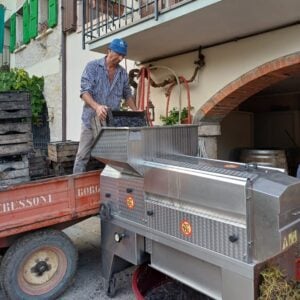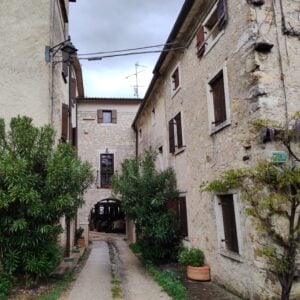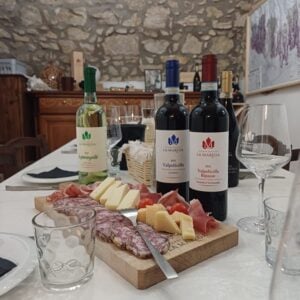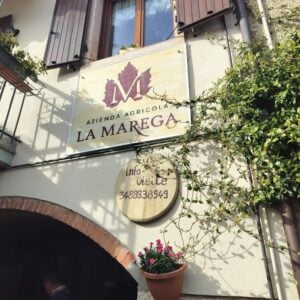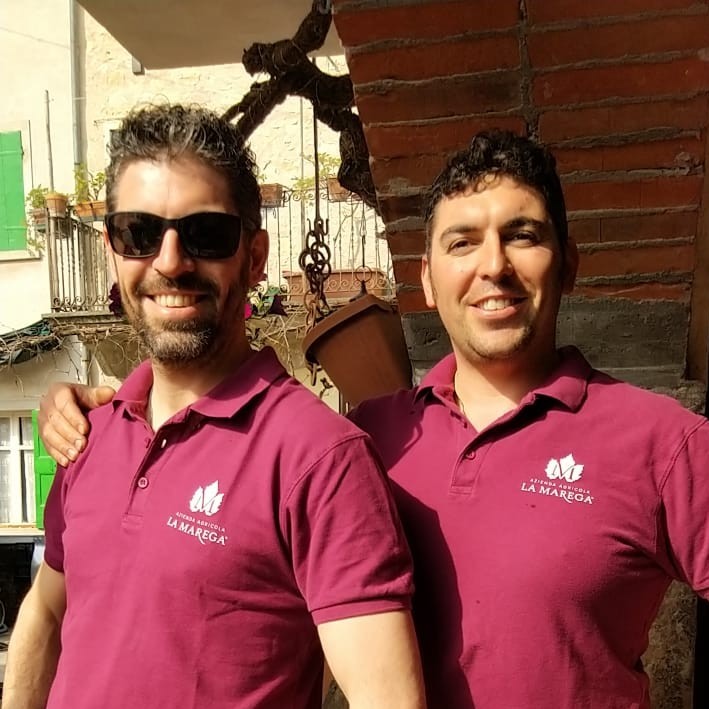
We continue our chats with producers, and this time we take you to the hills in the heart of Valpolicella Classica, in Fumane. Here is located the Azienda Agricola La Marega, a tiny business that produces high-quality wines. The winery is managed by two brothers, Daniele, who takes care of the commercial side, and Marco, who is responsible for production. It was with Marco that we had the opportunity to exchange a few words, inevitably with a few glasses of wine in front of us.
Marco, the first word I am going to propose to you is CURIOSITY. In fact, I am very fascinated by the fact that you, despite being born in the family farm, were absolutely not obliged to continue the activity, in fact initially you had undertaken another path. At a certain point, however, it was curiosity that pushed you to study and learn about the world of wine (which has always been part of your life) not only from a production point of view, but also historiographical.
- Yes, let’s say that curiosity came later, in the sense that first of all there was a great desire to succeed, that determination that makes you say “why do others make it and I don’t? Why do others succeed and I remain in the shadows? If others succeed I have to do better”. So curiosity came later, because when you become passionate about a product or a territory you tend to look for the links that have existed over the centuries between man and that product or territory, and as far as Valpolicella is concerned, without a doubt the most successful marriage is that between man and vine. So the customer who enters the company does not simply want to buy a product, whether white or red, but wants to take home a piece of the company and the territory. And in this case I represent the company, and I describe the territory through my eyes, so perhaps this is what pushed me to do something more than simply sell a product. In my opinion, the added value of the company is precisely that of giving the customer a piece of history and a piece of territory, which remains alive and intact even if you take it to the other side of the ocean.
Also linked to this topic, your curiosity is also directed towards the future. In fact, every year you do your tests and experiments during the winemaking phase, so there is always a great desire to explore new paths to be able to bring new products to the customer.
- The company is always a “work in progress”: every year you hope to get there, but then you discover that the finish line moves. In a fluid company like ours, which must keep up with the market and the taste of the users, you have to be dynamic, as our wines are dynamic. But be careful: our wines change not to chase the customer, but because we within the company change, who give ourselves new goals and new targets. In the world of wine you always have to be on the move, to seek not perfection, which is very difficult to achieve, but improvement both on a human level and in terms of products. When in a company you find wines that are more or less standard every year, it means that that company has reached a standstill and has nothing left to express, it no longer has “emotions to sell”. And for me a winery that has reached this point, no longer has a goal, no longer has room for improvement, it just has to maintain the standard, and this is much simpler than improving.
Moving on to the next concept, we have already partially anticipated it, because it is that of IDENTITY. Your wines are very much the identity of this territory, of the Marega and of your estate, and of you as a person. With such a rigorously artisanal production as yours, inevitably then in the wine you find characteristics that are peculiar to the producer himself.
- Right. As we were saying earlier, wines change because producers change. In my opinion, wines must reflect the hand of those who produce them, they must convey those emotions that we feel when we see a product being born. Here we do not have the ambition to create anything, but simply witness the birth of great wines, which is a different thing because respect for the grapes and respect for the final product remains intact. When you have the presumption to say “I create” you are already wrong, it is better to say “I observe, I assist and I accompany” the product. But getting back to the point, yes, our wines are all very identifying, modern wines that wink at the past or vice versa. And this is not an easy operation, because modernity also means dusting off the old, and we try to dust off techniques and equipment from the past to create modern wines, which nevertheless remain extremely identifying with our territory, the native vines and the winemaking techniques. If we wanted to make a product that was much more appealing to the public, we would work in a completely different way, introducing international grape varieties, which are more appealing on the market, but we work the other way around. It is the customer who must find our wine right, not the wine that must please everyone. Here, the wine must go its own way, and find its dimension within a market that is already very saturated, but which also requires something new and more emotional. And it is precisely in this market segment that we place ourselves: traditional and authentic wines, but which are able to offer something more.
One thing that definitely comes out of your words is the pride you feel towards your wines, like a father is proud of his children. As we just said: you see them being born, you accompany them, and then they each go their own way.
- Having seen them born and having accompanied them, knowing their strengths and weaknesses deeply, certainly the relationship I have with my wines is very visceral. And I won’t deny that sometimes, when a vintage that we found excellent runs out, it’s a bit sad. Like a child who leaves home to go elsewhere. A parent knows perfectly well that it is nature that imposes it, but we never talk about the disappointment that remains for parents when they see their children go their own way. I have always been very proud of our work, of our wines, I always try to give a deep personality to our products, which is ultimately the identity of us at home, not only mine, but also of my brother, my dad, and of all the collaborators of this company. As for pride, I am proud of my wines as I am of my countryside, of my grapes, of my cellar. We start from there to have the right determination to face every difficulty. So let’s hope that this pride never ends.
Well, in conclusion, if you want to add something, I’ll leave the floor to you…
- One thing I always want to emphasize is that to see great wines born, you need deep skills, and skills are acquired when you get to understand historically where you are placed. You need to have a deep knowledge of your wines, the origin of the grapes, the ripening times, and the history of those who came before us. This allows you to understand some of the dynamics that revolve around us, and only then can you go and offer the market wines of a certain thickness that also bear your signature.
If you start with very good raw materials, grapes, it is easier to produce great wines, but if you do not have a 360° knowledge of what is around you, you will not go very far. It may be a flash in the pan, but without consistency you will not go very far. And, given the complicated climatic conditions that have occurred in recent years, maintaining consistency in the quality of our products is perhaps the greatest difficulty we are encountering in the company. When you work with products of such high quality (not according to us, but according to many others), making a misstep is unfortunately very easy. When you put a wine on the market that is below the standards you have accustomed the customer to, it makes much more noise than coming out with an even more excellent wine than the previous ones.
Yes, we’re getting back to where we started. There is this curiosity, this urge that continually pushes you to study and inform yourself in various fields, because there are many things that end up in a bottle of wine.
- To make great wines you need knowledge, and knowledge is a consequence of curiosity. It is a continuous studying, testing, visiting and chatting with other producers, tasting, and having the ambition to continue improving. Luckily we are in Italy, so there are so many vines, realities, denominations, that it is easy to feed my thirst for knowledge.
Linked to this urge, PASSION comes to mind. You will tell me “Anna, without passion you don’t go anywhere”,…
- I always say: those who work with their hands are workers, those who work with their hands and their head are craftsmen, but those who work with their hands, their head and their heart are artists. And all artists have passion, otherwise they wouldn’t make art. So passion is ultimately the fuel of our work, what gives you the strength to push yourself further, improve yourself and experiment. For example, once the fermentations are finished I can’t wait for the following year, to try new things. The end of each fermentation brings with it many questions about how things could have been done differently, and therefore the desire to do more to try to find new paths and solutions. Yes, passion is exactly what moves everything, it is the love for your work. “The love that moves the sun and the other stars”, to quote the great poet Dante Alighieri.
With this illustrious literary quote we conclude the chat, but if you are curious to meet Marco in person, join one of our tours in Valpolicella. We are waiting for you!
If you already know their wines or would like to taste them, you can find them on our online shop, and we will deliver them directly to your place!


